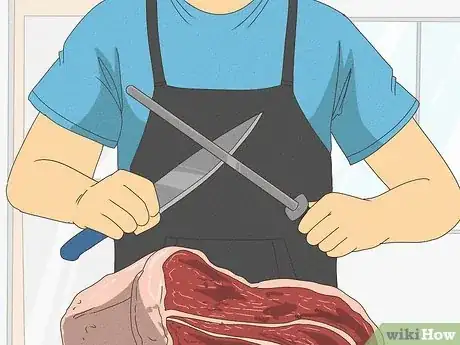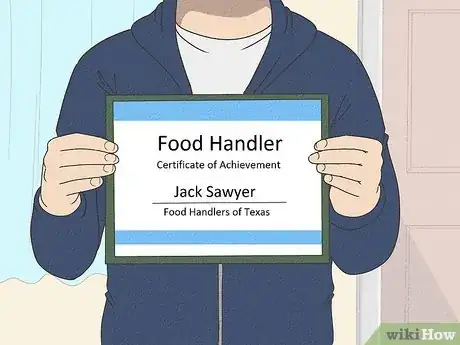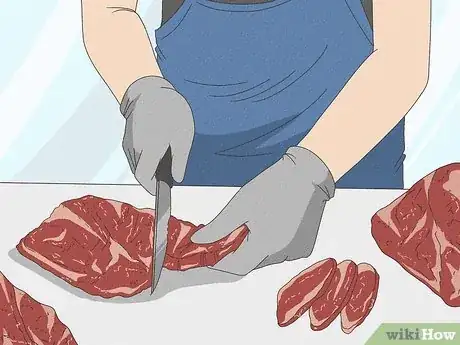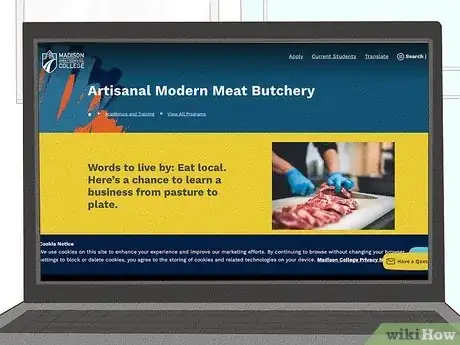This article was co-authored by wikiHow staff writer, Jennifer Mueller, JD. Jennifer Mueller is a wikiHow Content Creator. She specializes in reviewing, fact-checking, and evaluating wikiHow's content to ensure thoroughness and accuracy. Jennifer holds a JD from Indiana University Maurer School of Law in 2006.
There are 9 references cited in this article, which can be found at the bottom of the page.
This article has been viewed 1,652 times.
Learn more...
If you like working with your hands and want to be involved with food in some way, becoming a butcher might be right up your alley. As of 2021, the average butcher in the US earns around $36,000 a year—with skilled artisanal butchers earning even more.[1] X Trustworthy Source US Bureau of Labor Statistics U.S. government agency that collects and reports labor-related information Go to source But the best part is that it's not hard to get your foot in the door of this exciting career—just find work at a deli or the meat counter of a grocery store and you can learn on the job. Read on to learn everything you need to know about how to join this age-old trade.
Things You Should Know
- Apart from high school, you typically don't need any specific education to get started as a butcher.
- Start as a meat cutter and train on the job to become a butcher.
- Develop strength and stamina to enhance your performance over long hours on your feet.
- Specialize your skills through additional training or certifications to increase your potential earnings.
Steps
Familiarize yourself with a butcher's job duties.
-
Get a sense of a day in the life of a butcher so you can better prepare. The easiest way to do this is to go to a butcher's shop and ask if you can shadow them for a day to learn about the business. Expect your day to start early and end late![2] X Research source
- Butchers do a lot of work before the shop even opens, inspecting the stock, preparing displays, and prepping customer orders.
- Throughout the day, multi-tasking is important because you'll be inspecting, cutting, weighing, and wrapping orders as well as interacting with customers.
- Typically this is active and fast-paced work. Even when there aren't customers waiting, there's still a lot of clean-up and prep work to do.
Graduate from high school.
-
Most employers require at least a high school diploma or the equivalent. Even though there's no formal education required to become a butcher, graduating from high school shows that you have basic math and language skills. You might be able to start as a meat cutter in some grocery stores before you finish high school.[3] X Research source
- Taking some shop classes in high school will help you gain familiarity with hand and power tools—transferable skills you can take with you into your trade as a butcher.
- Specific education requirements vary depending on what country you live in, but this is a trade you can start without any additional higher education pretty much anywhere.[4] X Research source
Get a food handler's certification if required.
-
Some states require anyone handling raw meat to get certified. The certification shows that you know the basic safety and sanitation requirements for handling raw meat. Typically, you'll take a short course followed by an exam to get certified.[5] X Trustworthy Source US Bureau of Labor Statistics U.S. government agency that collects and reports labor-related information Go to source
- In some places, such as in Canada, you can also get a trade certification—but this isn't required to start work as a butcher.[6] X Research source
Work as a meat cutter to gain experience.
-
Start out fulfilling customer orders using pre-separated meat. Butchers do the heavy work of separating the meat into specific cuts, while meat cutters slice those cuts to fulfill specific orders. You'll learn how to cut and weigh meat, as well as how to inspect it for flaws or potential health risks. Along the way, you'll also learn the proper ways to store and handle meat.[7] X Trustworthy Source US Bureau of Labor Statistics U.S. government agency that collects and reports labor-related information Go to source
- Since grocery stores and delis are pretty much always looking for help, it shouldn't be too hard to find openings. Once you've got your foot in the door, show enthusiasm, confidence, and a willingness to learn.
- Because butchers often deal directly with customers, it's helpful if you can show that you have good retail experience.[8] X Research source This includes working in a restaurant or at a grocery store.
- After a few months as a meat cutter, if you show interest, you can start learning how to do more complex cuts and handle larger pieces of meat.
Join a formal apprenticeship program.
-
Formal apprenticeship programs help you advance more quickly. If there's a union in your area, call them up and ask how you can sign up for their apprenticeship programs. The majority of the program consists of on-the-job training, but there's also a classroom component where you learn about types and cuts of meat. While you'll typically have to pay union dues, the program itself won't cost you anything.[9] X Research source
- As a member of the union, you also get plenty of support, including job placement once you complete the apprenticeship program.
Build your manual dexterity to improve your knife skills.
-
Practice hand and finger exercises to improve your fine motor skills. Even playing a musical instrument or video games can improve your manual dexterity. Steady hands and good control of your hand and finger movements are essential for the safe and efficient butchering of an animal. As you continue your training, you'll continue to fine-tune this skill to become an even better butcher over time.[10] X Trustworthy Source US Bureau of Labor Statistics U.S. government agency that collects and reports labor-related information Go to source
- The cut can impact the flavor and presentation of the meat as well, and a great butcher is an artist. You'll know you've got what it takes when customers start requesting cuts from you specifically!
Be able to lift up to 50 pounds (23,000 g).
-
Build your physical strength and stamina over time on the job. Being a butcher can be physically demanding—especially during busy holiday seasons. Improve your physical fitness so you can move heavy meats around and stay on your feet without getting too sore or tired.[11] X Trustworthy Source US Bureau of Labor Statistics U.S. government agency that collects and reports labor-related information Go to source
- If you're used to sitting for most of the day, do what you can to spend more time on your feet—even if it means you're watching TV standing up. It'll prepare you for a typical workday.
- Work on building your upper body strength so you're able to lift heavy meat boxes and carry them around.
Get advanced education to hone your skills.
-
An associate's or bachelor's degree distinguishes you from other applicants. While a college degree isn't required to become a butcher, it's definitely not going to hurt your chances of getting hired! Check with your local community college to see what programs they offer in meat sciences or meat processing. Many state universities offer meat processing degrees as well if you'd rather go for a bachelor's.[12] X Research source
- Some of these programs have a specialty focus. For example, the Madison Area Technical Community College in Madison, Wisconsin offers an artisanal modern meat butchery diploma that capitalizes on the farm-to-table culinary trend.[13] X Research source
- If you dream of opening your own butcher's shop someday, you might think about a degree in business so you'll know what it takes to get the place up and running.
Seek special training to become a kosher or halal butcher.
-
Kosher and halal butchers need religious training and certification.[14] X Trustworthy Source US Bureau of Labor Statistics U.S. government agency that collects and reports labor-related information Go to source If you're Jewish or Muslim, talk to your local synagogue or temple about becoming a kosher or halal butcher. Typically, you must be a practicing member of the faith who is at least 18 years old to start the training, which takes a couple of years.
- Halal's main focus is the initial slaughter of the animal, but there are also some rules related to the preparation and handling of the meat.[15] X Research source
You Might Also Like










 How to Grow and Improve Your Soft Skills
How to Grow and Improve Your Soft Skills



References
- ↑ https://www.bls.gov/ooh/production/butchers-and-meat-cutters.htm#tab-5
- ↑ https://tasteyourfuture.ca/day-butchers-life/
- ↑ https://www.labormarketinfo.edd.ca.gov/OccGuides/detail.aspx?Soccode=513021&Geography=0601000000
- ↑ https://nationalcareers.service.gov.uk/job-profiles/butcher
- ↑ https://www.bls.gov/ooh/production/butchers-and-meat-cutters.htm#tab-4
- ↑ https://www.vpl.ca/siic/guide/employment-guides/butchers/how-do-i-become-butcher
- ↑ https://www.bls.gov/ooh/production/butchers-and-meat-cutters.htm#tab-4
- ↑ https://nationalcareers.service.gov.uk/job-profiles/butcher
- ↑ https://www.labormarketinfo.edd.ca.gov/OccGuides/detail.aspx?Soccode=513021&Geography=0601000000
- ↑ https://www.bls.gov/ooh/production/butchers-and-meat-cutters.htm#tab-4
- ↑ https://www.bls.gov/ooh/production/butchers-and-meat-cutters.htm#tab-4
- ↑ https://www.ndscs.edu/news/36144/ndscs-offering-meat-processing-program
- ↑ https://madisoncollege.edu/academics/programs/meat-production
- ↑ https://www.bls.gov/ooh/production/butchers-and-meat-cutters.htm#tab-4
- ↑ https://animalscience.tamu.edu/wp-content/uploads/sites/14/2016/01/Halal-Foods.pdf
About This Article






















































